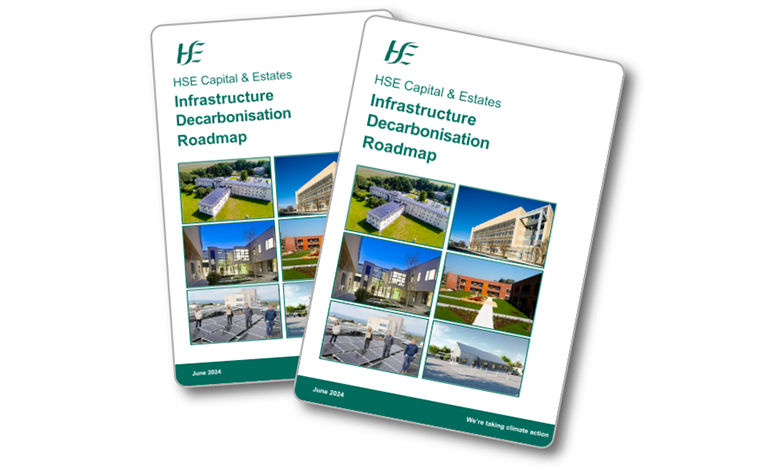New roadmap outlines the HSE pathway to decarbonisation

The Health Service Executive (HSE) has unveiled a new roadmap to adhere to decarbonisation targets set out in the Government’s Climate Action Plan.
Climate Action Plan 2024, published by the Government in 2023, sets out the energy efficiency and energy related greenhouse gas (GHG) emissions reduction targets, which all public sector bodies in the State are legally obliged to meet.
To adhere to these targets, the HSE Capital and Estates launched the Infrastructure Decarbonisation Roadmap, which outlines seven action areas on how they can reduce GHG emissions from the sector by 51 per cent, and improve their energy efficiency by 2030.
Action area one: Continue and enhance the HSE partnership agreement with SEAI and develop leadership roles
In 2018, HSE Capital and Estates entered into a partnership arrangement with the Sustainable Energy Authority (SEAI), which established a joint co-funding memorandum of understanding to progress the energy efficiency agenda in the HSE.
The HSE states it will continue to provide leadership in the area of energy and carbon emissions reduction and will update its Infrastructure Decarbonisation Roadmap annually.
Action area two: Regional Energy Bureau, Energy Management Teams and Shallow Retrofit Programme
The HSE’s aim is to increase the number of local energy management teams, with a target of 165 teams by the end of 2024, with 138 energy teams in place and supported at the end of Q4 2023.
The HSE states it will ensure that the energy management teams are incorporating staff workshops and supported energy retrofit minor capital programmes.
Action area three: Energy efficient design (EED) process and net carbon zero ready design
This area will see the implementation of an EED and carbon zero ready design approach for all capital works including a national training programme.
Action area four: Deep Energy and Carbon Retrofit Programme
The HSE plans to progress a Deep Energy Retrofit Programme, targeting existing buildings to decarbonise appropriate elements of the health portfolio. This will include replacing fossil fuels with renewables and electrifying heat and transport.
Action area five: Metering, modelling, reporting and energy management systems
The HSE states it will develop metered data and utility supplier data including integration with the new National Estates Information System.
Action area six: Behavioural Training and Learning
As outlined in the roadmap, the HSE will continue a programme to develop advice, guidance and training support to reduce energy and to conserve water.
Action area seven: Support to the wider HSE Climate Action Strategy
As part of the HSE’s wider climate action strategy, the roadmap will provide support to the implementation of the strategy in areas of transport and mobility, sustainable procurement, greener models of healthcare, waste management, adaptation and resilience.
The roadmap forms an integral part of the HSE Capital and Estates Strategy and Implementation Plan 2022-2050 in addressing the estates objective for net carbon zero by 2050. It has outlined the work undertaken by the HSE Capital and Estates to date and their continued approach to achieve the targets set out in CAP24 through reduction of carbon emissions from their buildings and their operation, by reducing energy usage and shifting the HSE’s energy sources from fossil fuels towards renewable and carbon zero energy sources.





